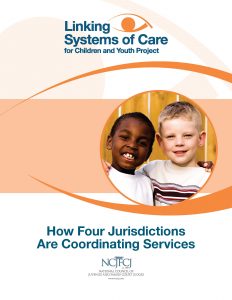 Children, youth, and young adults who are survivors of traumatic events during their formative years often encounter multiple human service and legal systems. Serving youth with multi-system experiences requires an approach that recognizes multi-system involvement, is aware of trauma histories, and links services by building upon resilience factors that encourage healing.
Children, youth, and young adults who are survivors of traumatic events during their formative years often encounter multiple human service and legal systems. Serving youth with multi-system experiences requires an approach that recognizes multi-system involvement, is aware of trauma histories, and links services by building upon resilience factors that encourage healing.
The National Council of Juvenile and Family Court Judges (NCJFCJ) is a non-profit membership organization for juvenile and family courts across the country (go to www. ncjfcj.org for more info). The NCJFCJ provides a wide range of resources, training, technical assistance, and research pertaining to issues and topics relevant to juvenile and family courts. From 2014 to 2021, the NCJFCJ has been the national technical assistance provider for a national demonstration project known as the Linking Systems of Care for Children and Youth Project (LSC).
The primary purpose of the LSC systems integration case studies publication is to highlight efforts that have successfully linked two or more systems that serve child victims of maltreatment and/or family violence. These highlighted efforts appear in the form of site profiles that present specific examples of programs that reflect key aspects of the LSC national demonstration project. Each of the sites selected for these profiles provides interventions and exhibits practices that reflect the LSC guiding principles and values, which are outlined below.
The LSC project team selected four jurisdictions to profile in this document. These sites are different in important ways and have different target populations for their services, but all share principles that are aligned with the LSC guiding principles, and the work done by the four LSC States (described below). First, they all aim to divert young victims away from formal interventions and toward therapeutic and healing services. Second, each example links an array of services across human service, legal/court, and behavioral health systems.
The first profile focuses on the Pima County (Tucson, Arizona) Juvenile Court’s Alternative Community Engagement Services (ACES) Center; the second describes the Connecticut School-Based Diversion Initiative (SBDI); the third covers The Harbor Program in Clark County (Las Vegas) Nevada; and the fourth highlights the King County (Seattle) Washington program for Commercially Sexually Exploited Children.